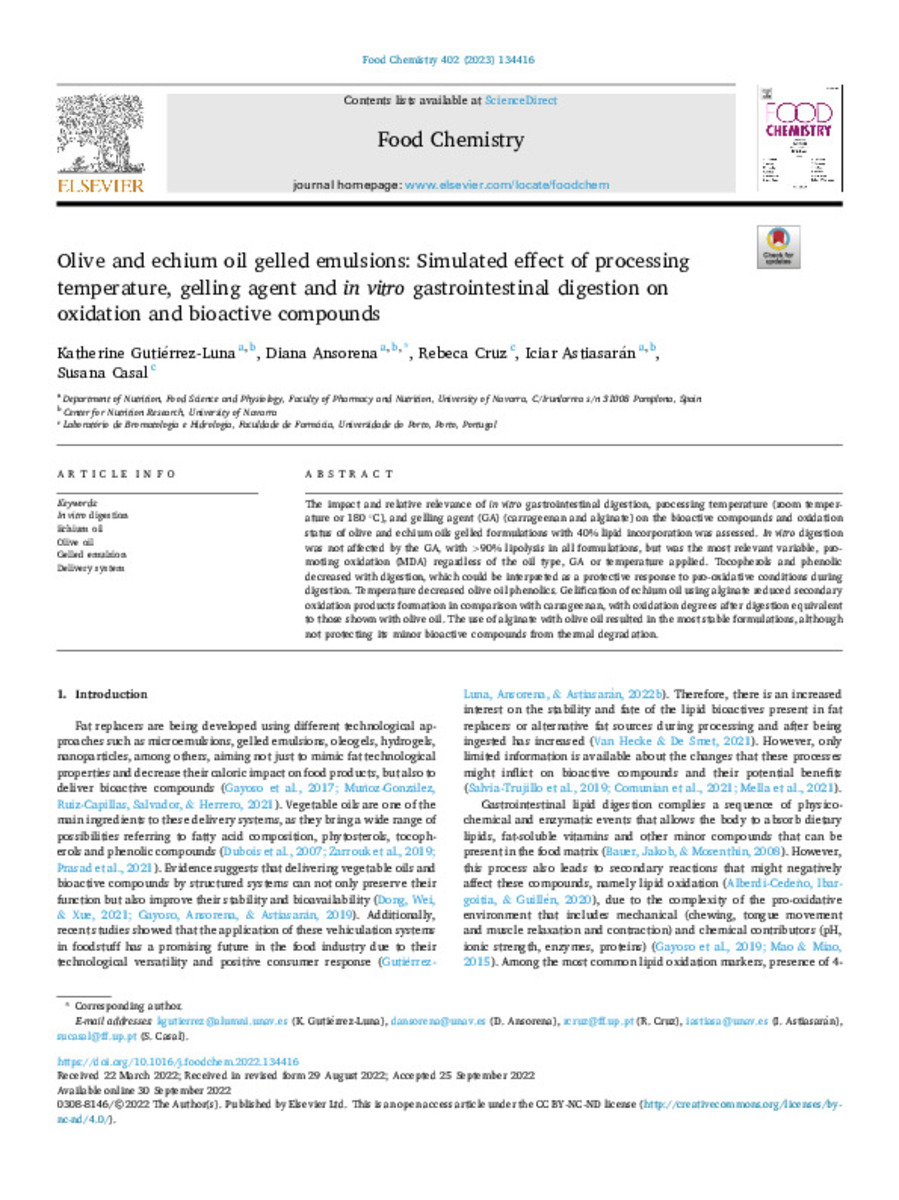Full metadata record
| DC Field | Value | Language |
|---|---|---|
| dc.creator | Gutiérrez-Luna, K. (Katherine) | - |
| dc.creator | Ansorena-Artieda, D. (Diana) | - |
| dc.creator | Cruz, R. (Rebeca) | - |
| dc.creator | Astiasarán, I. (Iciar) | - |
| dc.creator | Casal, S. (Susana) | - |
| dc.date.accessioned | 2023-04-27T08:56:01Z | - |
| dc.date.available | 2023-04-27T08:56:01Z | - |
| dc.date.issued | 2023 | - |
| dc.identifier.citation | Gutiérrez-Luna, K. (Katherine); Ansorena-Artieda, D. (Diana); Cruz, R. (Rebeca); et al. "Olive and echium oil gelled emulsions: Simulated effect of processing temperature, gelling agent and in vitro gastrointestinal digestion on oxidation and bioactive compounds". Food Chemistry. 402, 2023, 134416 | es_ES |
| dc.identifier.issn | 0308-8146 | - |
| dc.identifier.uri | https://hdl.handle.net/10171/66130 | - |
| dc.description.abstract | The impact and relative relevance of in vitro gastrointestinal digestion, processing temperature (room temper- ature or 180 ◦C), and gelling agent (GA) (carrageenan and alginate) on the bioactive compounds and oxidation status of olive and echium oils gelled formulations with 40% lipid incorporation was assessed. In vitro digestion was not affected by the GA, with >90% lipolysis in all formulations, but was the most relevant variable, pro- moting oxidation (MDA) regardless of the oil type, GA or temperature applied. Tocopherols and phenolic decreased with digestion, which could be interpreted as a protective response to pro-oxidative conditions during digestion. Temperature decreased olive oil phenolics. Gelification of echium oil using alginate reduced secondary oxidation products formation in comparison with carrageenan, with oxidation degrees after digestion equivalent to those shown with olive oil. The use of alginate with olive oil resulted in the most stable formulations, although not protecting its minor bioactive compounds from thermal degradation. | es_ES |
| dc.description.sponsorship | We are grateful to the PIUNA (Plan de Investigación de la Universidad de Navarra) and to FCT (Fundação Ciencia e Tecnologia) underproject UIDB/50006/2020 for the financial support. The research leading to these results has received funding from “la Caixa” Banking Foundation. K. Gutiérrez-Luna is grateful to “Asociación de Amigos de la Universidad de Navarra” for the pre-doctoral grant received and to Universidad de Navarra, Obra Social “La Caixa” and Fundación Bancaria Caja Navarra for the Mobility grant to pursue the “International Doctor Degree”. | es_ES |
| dc.language.iso | eng | es_ES |
| dc.publisher | Elsevier | es_ES |
| dc.rights | info:eu-repo/semantics/openAccess | es_ES |
| dc.subject | In vitro digestion | es_ES |
| dc.subject | Echium oil | es_ES |
| dc.subject | Olive oil | es_ES |
| dc.subject | Gelled emulsion | es_ES |
| dc.subject | Delivery system | es_ES |
| dc.title | Olive and echium oil gelled emulsions: Simulated effect of processing temperature, gelling agent and in vitro gastrointestinal digestion on oxidation and bioactive compounds | es_ES |
| dc.type | info:eu-repo/semantics/article | es_ES |
| dc.description.note | This is an open access article under the CC BY-NC-ND license | es_ES |
| dc.identifier.doi | 10.1016/j.foodchem.2022.134416 | - |
| dadun.citation.publicationName | Food Chemistry | es_ES |
| dadun.citation.startingPage | 134416 | es_ES |
| dadun.citation.volume | 402 | es_ES |
| dc.identifier.pmid | 36303378 | - |
Files in This Item:
Statistics and impact
Items in Dadun are protected by copyright, with all rights reserved, unless otherwise indicated.






